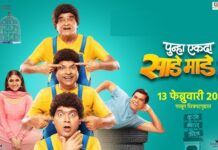Salman Khan Films and Kabir Khan Films’ Tubelight is a story about faith. The adage goes thus: Faith can move mountains. And that’s what the film, set in 1962, tries to prove.
Laxman Singh Bisht (Salman Khan) is a bit slow, probably because he has an underdeveloped brain. He lives in a small town called Jagatpur. Since childhood, his friends refer to him as Tubelight because, like a tubelight takes time to light up, he takes a while to understand things. His younger brother, Bharat (Sohail Khan), loves him a lot and understands his feelings. In fact, Bharat is so protective about Laxman that he doesn’t let anybody make fun of Laxman. Bharat and Laxman are orphans. Banne Chacha (Om Puri) is like their local guardian.
One day, army officer Major Rajbir Tokas (Yashpal Sharma) comes to Jagatpur to exhort young men to join the army as the growing tension on the Indo-China border could escalate into a war. While many youngsters, including Bharat, are selected, Laxman is rejected. Laxman bids a tearful adieu to younger brother Bharat when he leaves for a probable war. Unable to live without Bharat, Laxman often goes to army office Major Tokas at the base camp to enquire after his brother.
Soon, war between India and China is declared. Seeing Laxman’s predicament, concern and tension for his younger brother, Banne Chacha asks Laxman to keep his faith alive – faith that Bharat would return soon. Banne Chacha also teaches Laxman about the principles which Mahatma Gandhi stood for, such as brotherhood, compassion, faith etc. Trying to emulate Mahatma Gandhi and walk the path traversed by him, Laxman befriends a little Chinese boy, Guo (Master Matin Rey Tangu), who lives at Jagatpur with his widowed mother, Liling (Zhu Zhu). He firmly believes that his friendship with the Chinese would go a long way in ending the war between India and China. While several people in Jagatpur are anti-Chinese, there is one, Narayan (Mohd. Zeeshan Ayyub), who can’t bear the sight or mention of a Chinese. Why, Narayan even wants that Guo and his family leave Jagatpur. But Guo and his family, who’ve come from Calcutta, insist that they are as Indian as any Indian because they and their ancestors have been living in India since generations. They also speak fluent Hindi.
Tension in Jagatpur keeps mounting as the war between the two countries intensifies. Some jawans from Jagatpur are killed in the war and their bodies are received by weeping family members. Laxman’s confidence is often shaken but Banne Chacha’s philosophy about Mahatma Gandhi’s teachings prompts him to keep the faith alive. One day, Narayan pokes fun at Laxman’s talk about keeping the faith alive and he challenges Laxman to move the mountain literally, with his faith. And that happens – Laxman’s faith in himself, literally moves the mountain. Although the newspaper the following day attributes the movement of the mountain to an earthquake, most of the people of Jagatpur now consider Laxman as someone who can’t be taken lightly. From Tubelight, who used to be laughed and scoffed at, Laxman has suddenly become a person to be respected. It is now the turn of the army Major to approach Laxman to use the power of his undying faith to actually stop the war between the two countries.
Will Laxman’s faith stop the Indo-China war? Will it bring back his brother to Jagatpur?
The film is an official adaptation of Hollywood film Little Boy. The story gives too much importance to faith. There’s no harm in that but the story is so half-baked that the undue importance given to faith gets on the audience’s nerves. Showing Laxman, played by Salman Khan, as dim-witted is not an intelligent move if only because Salman’s personality and image are far more overpowering than Laxman’s character. In fact, not just Salman Khan but the story as a whole also looks fake and seems to have been written without much feeling.
The screenplay, penned by Kabir Khan and Parveez Shaikh, is kiddish. The concept of ‘faith’ becomes a joke after a point of time as everyone who meets Laxman – right from Mahatma Gandhi when Laxman was a little boy, to Banne Chacha to the magician to Liling to everybody else he comes in contact with – talks about keeping the faith alive. This hardly rings true because nobody in real life attaches so much importance to faith. Even if one does attach a lot of significance to faith, everybody around him also attaching as much importance to it looks far-fetched and contrived. Banne Chacha’s lessons to Laxman are equally half-baked. The people of Jagatpur town are shown to be mocking at Laxman during the magic show but do an about-turn – and rightly so! – when Laxman’s faith moves a bottle kept on a table. In spite of having experienced this exhibition of the power of his faith, the people of Jagatpur openly mock at Laxman once again when Narayan challenges him to move the mountain by using the power of his faith, leading the audience to wonder how many times Laxman would have to prove himself. It is on such occasions that the viewer gets the feeling that it is not just Laxman who is dumb but the township as a whole comprises far dumber people. Probably worse than that is the idiosyncrasy of the people of the town to actually believe that Laxman had moved the mountain, even after the newspaper report that an earthquake was the real cause. The ultimate madness is when none other than the highly educated army Major pleads with Laxman to stop the Indo-China war, using the power of his undying faith! The scene is unintentionally hilarious!
Laxman’s mind becomes slow when it suits the writers and works normally when it is convenient for them to show that. For instance, Laxman is aware that the Chinese army men would kill the Indian soldiers in their captivity but is dumb enough to ask whether the Indian army men would be set free if the war were to end.
The screenplay is so shabbily written that the emotions fail to move the audience. Rather, making the hero – Laxman – cry every now and then looks ridiculous, never mind if he is dim-witted. Why, the hero (Laxman) even gets slapped so many times by his friend, Narayan. The writers may like to believe that shedding tears and getting slapped goes with the character of Laxman but they have failed to appreciate that firstly, Laxman is the hero of the drama and nobody likes to see a cry-baby and a stupid hero, and secondly, the actor playing Laxman is Salman Khan who has a macho image which the weak screenplay is unable to erase from the viewers’ minds. Narayan’s repeated outburst against the Chinese family seems a bit weird, especially when Laxman, whose brother is on the border, has no problem with the family! What is Narayan’s stake in the war, for him to revolt against the Chinese family more than Laxman, whose brother is fighting the war?
For those looking for the regular ingredients of a commercial fare, the drama lacks romance. Further, only a couple of emotions touch the heart. Compare this with Laxman crying every now and then, and the audiences definitely have a problem. Why, even the bonding between Laxman and Guo fails to evoke the required sentiments. There is humour but not of the kind which will have the audience laughing loudly or even smiling from ear to ear. All in all, this Tubelight has a faulty choke (story-screenplay).
Manu Rishi Chaddha’s dialogues aren’t as heart-warming and heartfelt as they should’ve been. For a film of the magnitude, scale and canvas as Tubelight, nothing short of extraordinary and patriotic dialogues would have been ideal.
Salman Khan tries to give his cent per cent to the character of Laxman/Tubelight but he succeeds only at times. That is to say, he is able to make an impact in some scenes but leaves the audience unaffected by his innocence and dim-wittedness otherwise. He looks too bulky in many scenes, and this could’ve easily been avoided. Sohail Khan gets limited scope and is strictly okay. Om Puri lends ordinary support. Zhu Zhu, as Liling, looks pretty and acts with likeable ease. Mohd. Zeeshan Ayyub is earnest, as Narayan, but his hot-headed character doesn’t seem too justified, especially because nobody close to him is directly affected by the war. In other words, his characterisation is weak. Yashpal Sharma provides fair support as the army officer, Major Rajbir Tokas. Master Matin Rey Tangu impresses as little Guo. Brijendra Kala, as the shop-owner, and Isha Talwar, as Maya, get limited scope and are okay. Shah Rukh Khan adds hardly anything in a tame special appearance although his performance is good.
Kabir Khan’s direction is definitely not upto the mark. Khan seems to lack conviction in the drama. His war scenes are not half as effective as they ought to have been. His lack of consistency is evident when a few thousand people are shown assembled during the mountain-moving sequence but not even a hundred people when the town is shown paying its last respects to the army men who laid down their lives in the war. This further underlines how mentally imbalanced the inhabitants of the town must be. What’s worse is that some people are shown leaving the prayer meeting midway (after attending it) even as Laxman is paying his last respects to his brother! One doesn’t expect such inconsistencies and flaws from a director of the calibre of Kabir Khan.
Pritam’s music does not befit the canvas of the film. ‘Sajan radio’ is the best song and is a hit; the other numbers are melodious but not of the hit variety. Amitabh Bhattacharya and Kausar Munir’s lyrics are meaningful. Of the song picturisations, ‘Sajan radio’ (by Remo D’Souza) is appealing. Picturisation of the ‘Naach meri jaan’ song (by Shabina Khan) is alright but not noteworthy. Julius Packiam’s background score is nice but not outstanding. Aamar Shetty’s action choreography (with action supervision by Glenn Boswell) is fair when it should’ve been terrific. Production designing by Rajnish Hedao, Sumit Basu and Snigdha Basu (Acropolis) is of a fine standard. Rameshwar S. Bhagat’s editing is fair.
On the whole, Tubelight is a very disappointing fare and lacks entertainment value. Considering the star-cast, the technical team and the canvas, it is a letdown and a poor show. Although the producers have made a humongous profit by selling its India theatrical, Overseas, satellite, digital and music rights, its distributors will incur heavy losses. Of course, the release in the Eid week will help the film but the negative word of mouth will ultimately tell on its business.




























